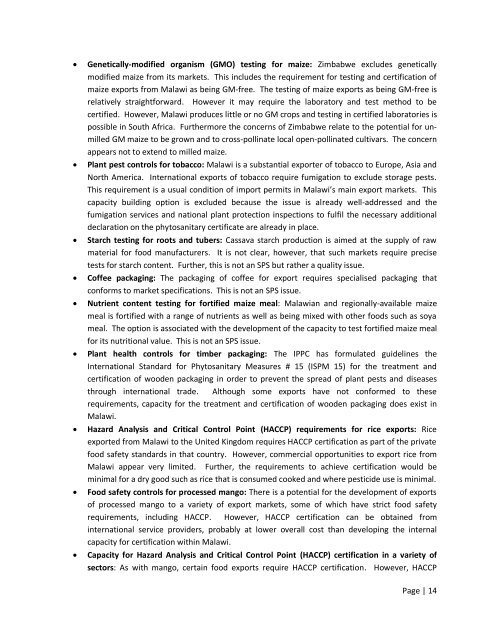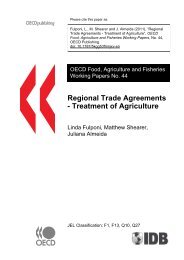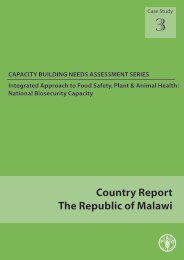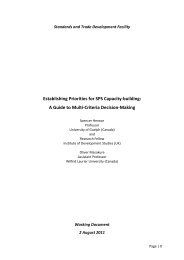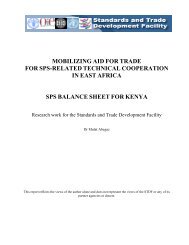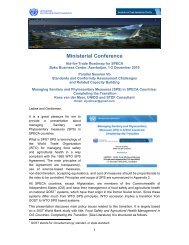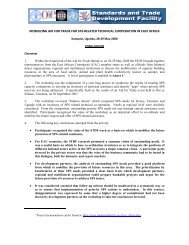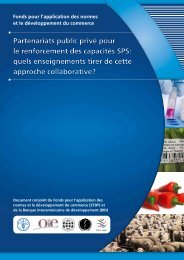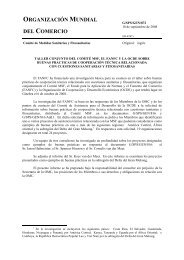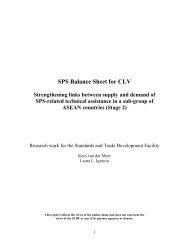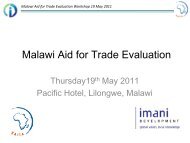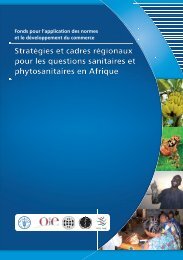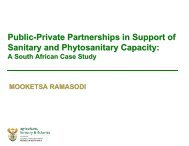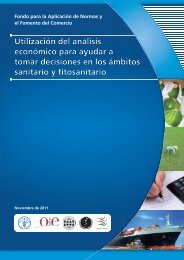MCDA Final Report Malawi - Standards and Trade Development ...
MCDA Final Report Malawi - Standards and Trade Development ...
MCDA Final Report Malawi - Standards and Trade Development ...
Create successful ePaper yourself
Turn your PDF publications into a flip-book with our unique Google optimized e-Paper software.
Genetically-modified organism (GMO) testing for maize: Zimbabwe excludes genetically<br />
modified maize from its markets. This includes the requirement for testing <strong>and</strong> certification of<br />
maize exports from <strong>Malawi</strong> as being GM-free. The testing of maize exports as being GM-free is<br />
relatively straightforward. However it may require the laboratory <strong>and</strong> test method to be<br />
certified. However, <strong>Malawi</strong> produces little or no GM crops <strong>and</strong> testing in certified laboratories is<br />
possible in South Africa. Furthermore the concerns of Zimbabwe relate to the potential for unmilled<br />
GM maize to be grown <strong>and</strong> to cross-pollinate local open-pollinated cultivars. The concern<br />
appears not to extend to milled maize.<br />
Plant pest controls for tobacco: <strong>Malawi</strong> is a substantial exporter of tobacco to Europe, Asia <strong>and</strong><br />
North America. International exports of tobacco require fumigation to exclude storage pests.<br />
This requirement is a usual condition of import permits in <strong>Malawi</strong>’s main export markets. This<br />
capacity building option is excluded because the issue is already well-addressed <strong>and</strong> the<br />
fumigation services <strong>and</strong> national plant protection inspections to fulfil the necessary additional<br />
declaration on the phytosanitary certificate are already in place.<br />
Starch testing for roots <strong>and</strong> tubers: Cassava starch production is aimed at the supply of raw<br />
material for food manufacturers. It is not clear, however, that such markets require precise<br />
tests for starch content. Further, this is not an SPS but rather a quality issue.<br />
Coffee packaging: The packaging of coffee for export requires specialised packaging that<br />
conforms to market specifications. This is not an SPS issue.<br />
Nutrient content testing for fortified maize meal: <strong>Malawi</strong>an <strong>and</strong> regionally-available maize<br />
meal is fortified with a range of nutrients as well as being mixed with other foods such as soya<br />
meal. The option is associated with the development of the capacity to test fortified maize meal<br />
for its nutritional value. This is not an SPS issue.<br />
Plant health controls for timber packaging: The IPPC has formulated guidelines the<br />
International St<strong>and</strong>ard for Phytosanitary Measures # 15 (ISPM 15) for the treatment <strong>and</strong><br />
certification of wooden packaging in order to prevent the spread of plant pests <strong>and</strong> diseases<br />
through international trade. Although some exports have not conformed to these<br />
requirements, capacity for the treatment <strong>and</strong> certification of wooden packaging does exist in<br />
<strong>Malawi</strong>.<br />
Hazard Analysis <strong>and</strong> Critical Control Point (HACCP) requirements for rice exports: Rice<br />
exported from <strong>Malawi</strong> to the United Kingdom requires HACCP certification as part of the private<br />
food safety st<strong>and</strong>ards in that country. However, commercial opportunities to export rice from<br />
<strong>Malawi</strong> appear very limited. Further, the requirements to achieve certification would be<br />
minimal for a dry good such as rice that is consumed cooked <strong>and</strong> where pesticide use is minimal.<br />
Food safety controls for processed mango: There is a potential for the development of exports<br />
of processed mango to a variety of export markets, some of which have strict food safety<br />
requirements, including HACCP. However, HACCP certification can be obtained from<br />
international service providers, probably at lower overall cost than developing the internal<br />
capacity for certification within <strong>Malawi</strong>.<br />
Capacity for Hazard Analysis <strong>and</strong> Critical Control Point (HACCP) certification in a variety of<br />
sectors: As with mango, certain food exports require HACCP certification. However, HACCP<br />
Page | 14


